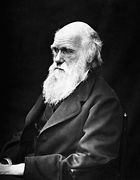The book aroused international interest, with less controversy than had greeted the popular “Vestiges of Creation”. Darwin had only said “Light will be thrown on the origin of man”, but the first review claimed it made a creed of the “men from monkeys” idea from “Vestiges”. Amongst early favourable responses, Huxley’s reviews swiped at Richard Owen, leader of the scientific establishment Huxley was trying to overthrow. In April, Owen’s review attacked Darwin’s friends and condescendingly dismissed his ideas, angering Darwin.
 The Church of England’s response was mixed. Darwin’s old Cambridge tutors Sedgwick and Henslow dismissed the ideas, but liberal clergymen interpreted natural selection as an instrument of God’s design, with the cleric Charles Kingsley seeing it as “just as noble a conception of Deity”. In 1860, the publication of “Essays and Reviews” by seven liberal Anglican theologians diverted clerical attention from Darwin. In it, Baden Powell argued that miracles broke God’s laws, so belief in them was atheistic, and praised “Mr Darwin’s supporting the grand principle of the self-evolving powers of nature”. Asa Gray agreed in discussion with Darwin that Natural Selection is not inconsistent with Natural Theology.
The Church of England’s response was mixed. Darwin’s old Cambridge tutors Sedgwick and Henslow dismissed the ideas, but liberal clergymen interpreted natural selection as an instrument of God’s design, with the cleric Charles Kingsley seeing it as “just as noble a conception of Deity”. In 1860, the publication of “Essays and Reviews” by seven liberal Anglican theologians diverted clerical attention from Darwin. In it, Baden Powell argued that miracles broke God’s laws, so belief in them was atheistic, and praised “Mr Darwin’s supporting the grand principle of the self-evolving powers of nature”. Asa Gray agreed in discussion with Darwin that Natural Selection is not inconsistent with Natural Theology.
In an 1860 public evolution debate during a meeting of the British Association for the Advancement of Science, the Bishop of Oxford Samuel Wilberforce, though not opposed to transmutation of species, argued against Darwin’s explanation. In the ensuing debate Joseph Hooker argued strongly for Darwin and Thomas Huxley established himself as “Darwin’s bulldog”. Both sides came away feeling victorious. Huxley claimed that on being asked by Wilberforce whether he was descended from monkeys on his grandfather’s side or his grandmother’s side, Huxley replied that he “would rather be descended from an ape than from a cultivated man who used his gifts of culture and eloquence in the service of prejudice and falsehood”.
 As “Darwinism” became widely accepted in the 1870s, good-humoured caricatures of him with an ape or monkey body symbolised evolution.
As “Darwinism” became widely accepted in the 1870s, good-humoured caricatures of him with an ape or monkey body symbolised evolution.
Even Darwin’s close friends Gray, Hooker, Huxley and Lyell still expressed various reservations but gave him strong support, as did many younger naturalists. Gray and Lyell sought reconciliation with faith, while Huxley portrayed a polarisation between religion and science. He campaigned against the authority of the clergy in education, aiming to overturn the dominance of clergymen and aristocratic amateurs under Owen in favour of a new generation of professional scientists. Owen claimed that brain anatomy proved humans to be a separate biological order from apes, and accused Huxley of advocating “Ape Origin of Man”. Huxley gladly did just that. His two year campaign was successful in discrediting Owen.
The “Origin of Species” was translated into many languages. This scientific text attracted attention from all walks of life, including the “working men” who flocked to Huxley’s lectures. Darwin’s theory also adopted by various movements at the time and became a key fixture of popular culture. Darwinism became a movement covering a wide range of evolutionary ideas. In 1863 Lyell’s “Geological Evidences of the Antiquity of Man” popularised prehistory, though his caution on evolution disappointed Darwin. Weeks later Huxley’s “Evidence as to Man’s Place in Nature” showed that anatomically, humans are apes, then “The Naturalist on the River Amazos” by Henry Walter Bates provided empirical evidence of natural selection. Darwin received Britain’s highest scientific honour, the Royal Society’s Copley Medal, awarded on 3 November 1864. That day, Huxley held the first meeting of what became the influential X Club devoted to “science, pure and free of religious dogmas”.

